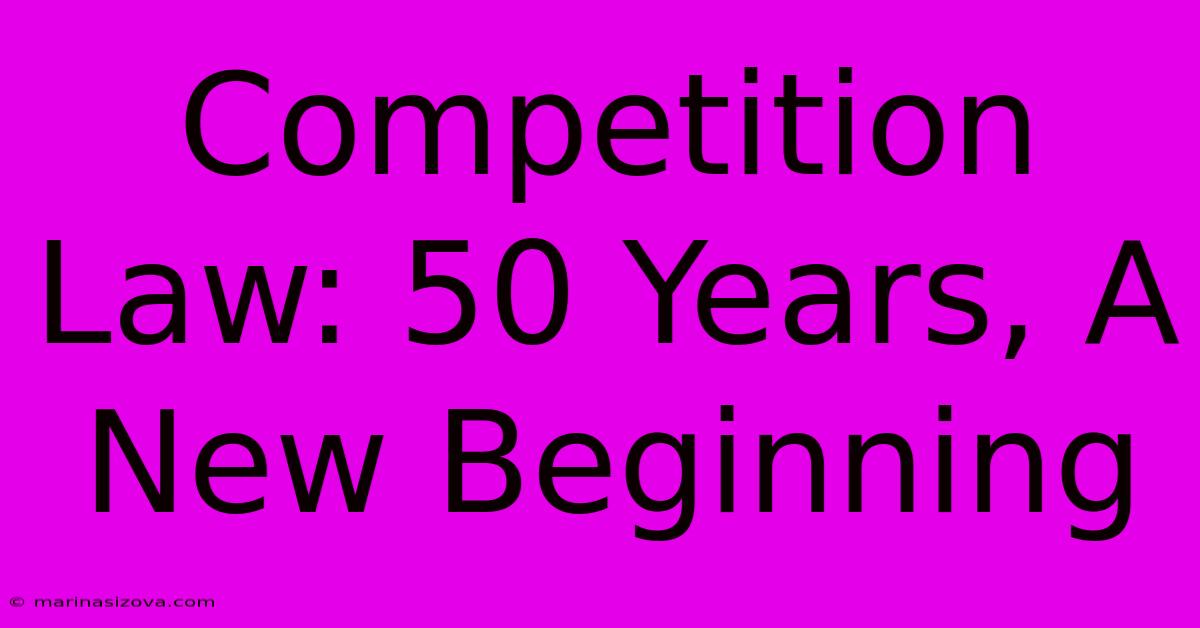Competition Law: 50 Years, A New Beginning

Discover more detailed and exciting information on our website. Click the link below to start your adventure: Visit Best Website. Don't miss out!
Table of Contents
Competition Law: 50 Years, A New Beginning
Competition law, also known as antitrust law, has been a cornerstone of fair and efficient markets for over a century. However, in the past 50 years, the landscape has transformed dramatically, driven by technological advancements, globalization, and the rise of new business models. This evolution has ushered in a new era for competition law, one that demands a fresh approach to tackling new challenges and shaping a future of innovation and consumer welfare.
A Look Back: From Monopolies to Digital Giants
The 20th century saw competition law evolve from its initial focus on combating traditional monopolies to addressing more complex issues like mergers and acquisitions, price-fixing, and predatory pricing. The goal remained the same: to foster competition by preventing anti-competitive practices that harm consumers and stifle innovation.
However, the dawn of the digital age brought about a paradigm shift. The rise of online platforms like Google, Amazon, and Facebook presented new challenges for competition law. These platforms, often referred to as "gatekeepers" of the digital economy, possess immense data, control access to consumers, and operate in increasingly complex ecosystems.
The New Challenges: Data, Market Power, and Innovation
1. Data as a Competitive Advantage: Digital platforms leverage vast amounts of user data to understand consumer preferences and tailor products and services. This access to data can create significant competitive advantages, potentially hindering market entry and innovation by smaller players.
2. Shifting Market Power Dynamics: Traditional market structures have blurred, and the power of digital giants has grown exponentially. This concentration of market power can lead to reduced consumer choice, higher prices, and stifled competition.
3. Fostering Innovation vs. Antitrust Enforcement: Competition law faces a delicate balancing act: protecting consumers from anti-competitive practices while simultaneously nurturing innovation. How can we ensure that regulations don't stifle the very innovation they are meant to protect?
A New Beginning: Embracing the Digital Age
To effectively address these challenges, competition law needs a refresh. This involves a renewed focus on:
1. Data-driven Market Power: Regulations need to address how data is used and shared, ensuring fair competition and preventing data-driven monopolies. This could include provisions for data portability, access to data for competitors, and increased transparency in platform algorithms.
2. Interoperability and Open Markets: Promoting interoperability between platforms and services can prevent the creation of closed ecosystems and ensure consumer choice.
3. Adaptive Enforcement: Competition authorities need to be agile and adaptable, constantly learning and responding to the ever-evolving digital landscape. This requires increased collaboration with experts in technology, economics, and law.
4. Promoting Innovation: Competition law should not just be about limiting anti-competitive behavior but also actively encouraging innovation. This could involve incentives for small businesses, open data policies, and fostering a culture of experimentation.
The Future of Competition Law
As we step into the next chapter of competition law, it's crucial to embrace a future-forward approach that balances protecting consumers with encouraging innovation. By adapting to the changing technological landscape, fostering fair market practices, and fostering a culture of competition, we can create an economy that benefits everyone, fostering a future of digital prosperity and consumer well-being.

Thank you for visiting our website wich cover about Competition Law: 50 Years, A New Beginning . We hope the information provided has been useful to you. Feel free to contact us if you have any questions or need further assistance. See you next time and dont miss to bookmark.
Featured Posts
-
Skytt Pa Fri Fot Efter Skjutningar I Oesterrike
Oct 29, 2024
-
All Points East 2025 First Headliner Revealed
Oct 29, 2024
-
Musiala On Bayern Loss To Barcelona Takeaways
Oct 29, 2024
-
18 Aring Pakjort Av Eldre Kvinne I Bergen
Oct 29, 2024
-
El Ultimo Puzzle Mensaje Brawl Stars
Oct 29, 2024
